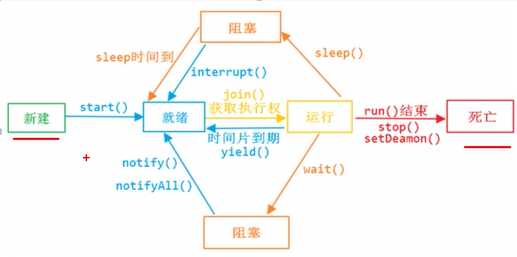Run和Start的区别,线程的生命周期,优先级,礼让和守护线程
线程常用方法和线程的状态
线程的生命周期图,及其调用线程的方法会改变的状态

调用run和start()的区别
package org.dance.day1; import org.dance.tools.SleepTools; /** * 线程调用 run 和 start 方法的区别 * @author ZYGisComputer */ public class StartAndRun { /** * 继承Thread类 */ private static class ThreadRun extends Thread{ @Override public void run() { int i = 90; while (i>0){ SleepTools.ms(1000); System.out.println("I am "+Thread.currentThread().getName()+" and now the i = "+ i); i--; } } } public static void main(String[] args) { // 执行run // executeRun(); // 执行start executeStart(); } public static void executeRun(){ ThreadRun thread = new ThreadRun(); thread.setName("run"); // 调用线程的Run方法 thread.run(); // 执行结果 // I am main and now the i = 90 } public static void executeStart(){ ThreadRun thread = new ThreadRun(); thread.setName("run"); // 调用线程的Run方法 thread.start(); // 执行结果 // I am run and now the i = 90 } }
SleepTools.java 这个只是一个小工具类,用于线程休眠的
package org.dance.tools; import java.util.concurrent.TimeUnit; /** * 类说明:线程休眠辅助工具类 */ public class SleepTools { /** * 按秒休眠 * @param seconds 秒数 */ public static final void second(int seconds) { try { TimeUnit.SECONDS.sleep(seconds); } catch (InterruptedException e) { } } /** * 按毫秒数休眠 * @param seconds 毫秒数 */ public static final void ms(int seconds) { try { TimeUnit.MILLISECONDS.sleep(seconds); } catch (InterruptedException e) { } } }
线程的优先级:
取值为1~10,缺省为5,但是线程的优先级并不可靠,不建议作为线程开发时候的手段,因为有的操作系统可能会忽略线程的执行优先级,所以开发中需要将这个不确定因素列如其中
设置线程的优先级方法,在源码中可以看见最小是1 默认是5 最大是10 大于或者小于报错
/** * The minimum priority that a thread can have. */ public final static int MIN_PRIORITY = 1; /** * The default priority that is assigned to a thread. */ public final static int NORM_PRIORITY = 5; /** * The maximum priority that a thread can have. */ public final static int MAX_PRIORITY = 10; public final void setPriority(int newPriority) { ThreadGroup g; checkAccess();
if (newPriority > MAX_PRIORITY || newPriority < MIN_PRIORITY) { throw new IllegalArgumentException(); } if((g = getThreadGroup()) != null) { if (newPriority > g.getMaxPriority()) { newPriority = g.getMaxPriority(); } setPriority0(priority = newPriority); } }
守护线程:
和主线程共死,finally不能保证一定会执行
package org.dance.day1; import org.dance.tools.SleepTools; /** * 守护线程 * @author ZYGisComputer */ public class DaemonThread { /** * 继承Thread类 */ private static class UseThread extends Thread { public UseThread(String threadName) { super(threadName); } @Override public void run() { try { String name = Thread.currentThread().getName(); while (!isInterrupted()) { System.out.println("当前线程:" + name); } System.out.println(name + " interrupt flag is " + isInterrupted()); } finally { System.out.println("执行 finally"); } } } public static void main(String[] args) { // 执行不是守护线程 // noDaemon(); // 执行守护线程 daemon(); // 对比之下就可以看到 // 不是守护线程 需要中断 主线程执行完毕之后不会停止 finally语句块一定会执行 // 守护线程 主线程执行完毕立即停止 finally语句块不一定会执行 } public static void noDaemon(){ UseThread useThread = new UseThread("DaemonThread"); useThread.start(); SleepTools.ms(5); useThread.interrupt(); } public static void daemon(){ UseThread useThread = new UseThread("DaemonThread"); useThread.setDaemon(true); useThread.start(); SleepTools.ms(5); } }
yield()方法
让出CPU的执行权,将线程的状态从运行转到可运行状态,但是下个时间片,该线程依然有可能被再次选中执行
作者:彼岸舞
时间:2020\09\15
内容关于:并发编程
本文来源于网络,只做技术分享,一概不负任何责任







【推荐】国内首个AI IDE,深度理解中文开发场景,立即下载体验Trae
【推荐】编程新体验,更懂你的AI,立即体验豆包MarsCode编程助手
【推荐】抖音旗下AI助手豆包,你的智能百科全书,全免费不限次数
【推荐】轻量又高性能的 SSH 工具 IShell:AI 加持,快人一步
· 从 HTTP 原因短语缺失研究 HTTP/2 和 HTTP/3 的设计差异
· AI与.NET技术实操系列:向量存储与相似性搜索在 .NET 中的实现
· 基于Microsoft.Extensions.AI核心库实现RAG应用
· Linux系列:如何用heaptrack跟踪.NET程序的非托管内存泄露
· 开发者必知的日志记录最佳实践
· winform 绘制太阳,地球,月球 运作规律
· AI与.NET技术实操系列(五):向量存储与相似性搜索在 .NET 中的实现
· 超详细:普通电脑也行Windows部署deepseek R1训练数据并当服务器共享给他人
· 上周热点回顾(3.3-3.9)
· AI 智能体引爆开源社区「GitHub 热点速览」